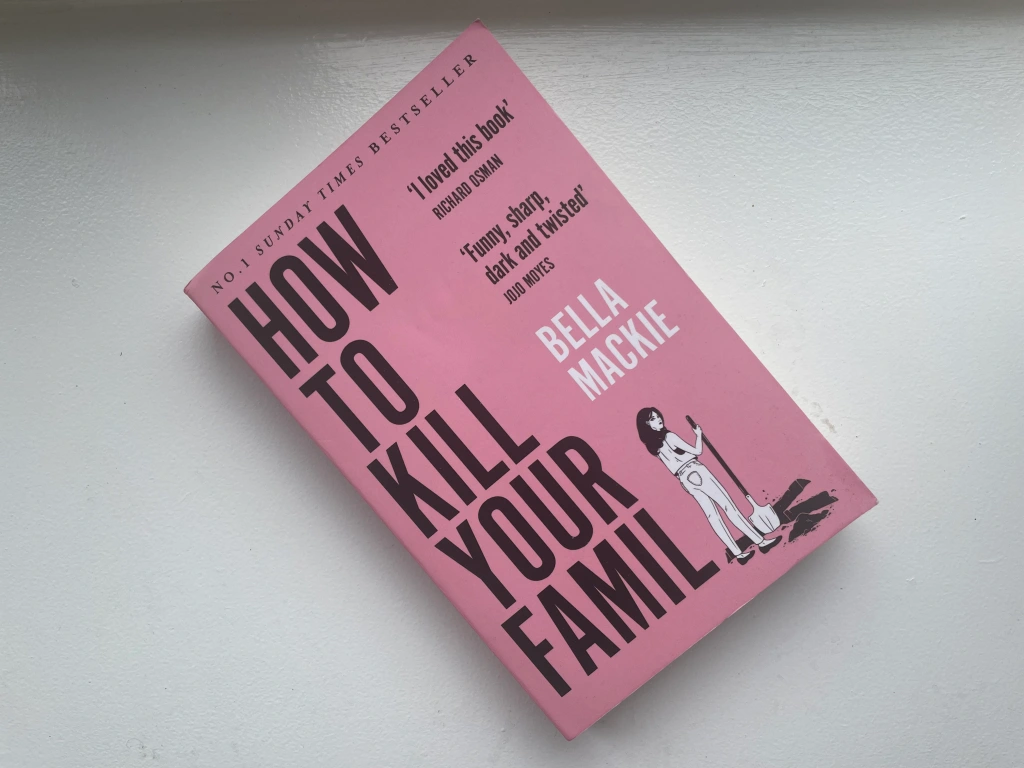Author: Bella Mackie
I was at WH Smith, browsing selections and gaining inspiration from book covers. They say not to judge a book by its cover, but I frequently do. It is one way that, as a visual person, I can connect to books before I begin reading them. You’re welcome to judge this method of book filtering as you find out how far it has gotten me. Check out the rest of my book blog to read more book reviews I’ve written.
I have 3 siblings, two parents, and a respectable number of extended family members. Not one member of my family let the book slide, and jokes were made each time I was reading in the family room.
I wish this book review could have been positive, as just the cover brought me some amusing memories and a few inside jokes. Unfortunately, this book landed on a lower spot of the potential delivery spectrum than I thought it would.
Quick Synopsis – No Spoilers
How to Kill Your Family is a book written by Bella Mackie about a woman in prison named Grace. She is ironically imprisoned for a crime that she did not commit and confesses to you, the reader, that she did in fact commit the crime of murder on various members of her family, but was never caught.
The book is a telling from her perspective on her thoughts and how she picked off those family members one by one.
How To Kill Your Family Book Review
Character Motives
If you read the back of the book, this synopsis paints Grace as a serial killer getting back at her family for everything they did to her. You come to expect a true crime book from the perspective of the serial killer.
Realistically, Grace is a serial killer, that much is true. With books like this you tend to want to be on the side of the main character. You know she’s a murderer, but you figure she must have good reason for it. I’m not saying Grace didn’t have good reason to take revenge on her family, I’m saying the good reasons weren’t Grace’s motivations.
I won’t spoil you, but I thought Grace had so much potential that she let go to waste, and I attribute this waste to her psychopathic thinking. There was ample time to analyse her thoughts, so she was easy enough to decipher.
Writing Style
When I say there was ample time to decipher Grace’s thoughts, I mean that you could attribute half of this book just to Grace’s thoughts. The mental dialogue goes on and on whether it belongs, feels necessary or even relevant or not.
This downside of Bella Mackie’s writing caused her book to drag on for ages, and eventually I had to begin skipping pages at a time just to get to the point. I read through, gradually decreasing attention and enjoyment until eventually I had to skim through text to make sure I didn’t miss anything – I didn’t.
In fact, there are sections of the book where Grace explicitly states that she doesn’t want to ramble before she does. For example, on the last paragraph of page 175, the line clearly states “I won’t waste time here” to indicate that she will not ramble about a topic that isn’t relevant. on the last paragraph of 176, she finished rambling with “Ah look, I have wasted time”.
Eventually, I felt my time was only slightly more valuable that to read unnecessary rambling that was ill-connected to the story, and decided to first skim, then eventually skip through pages to avoid boring tangents that contributed nothing to the story.
Character Analysis
The problem with a book mainly written to reflect the mental capacity, perspective and thought process of a serial killing psychopath when the writing feels disconnected and unnecessary is that the book will not impart the desired effect on its readers.
Rather than get into Grace is mind, I found her character a disjointed, incomplete mix up of paints on an easel. She was was slowly coming into the role of psychopath, and yet some of her actions seemed completely out of character for her role. You think of psychopaths as socially impeded, secluded people with a high IQ and a heightened capacity for emotions.
I did look up the symptoms of psychopathy and sociopathy before writing this, and honestly neither seemed to quite apply to Grace. Not only did she keep in touch with her adopted family, she had work friends whom she spent time with regularly.
Grace wasn’t obligated to be at Friday drinks events with the rest of the office, but she did. This isn’t even a spoiler because she does this before she even begins enacting her plan.
Additionally, Grace took everything so slowly, it didn’t fit into the symptoms of jumping on the fast-lane. Unfortunately, I was hoping that this book would be a well written deconstruction of the psychopathic/sociopathic serial killer mind.
While Grace did the things that serial killers do, and had some psychopathic tendancies and thoughts, she still didn’t fit the mould and I was left to wonder how her motives translated into action as someone who isn’t psychologically inclined to connect thoughts to action in this way.
Final Thoughts
To me, Grace is an incomplete, slightly ill-written character. It’s unfortunate, as the book held much promise with a strong title, cover and plot concept. Bella Mackie had a great idea and it felt like she let herself run away with the word count while losing focus on the narrative.
I will concede, while some won’t enjoy the ending, I found it caused me strong emotion which translates into a good ending for me. Still slow and drawn-out, but a good idea.
Additionally, and this has no bearing on the book review or star rating I’ve given How to Kill Your Family, but I would like to discuss it – I’m not sure I see Grace’s motives. I understand she isn’t written to be a stable character, but I don’t see how she made the connection from her childhood to an extended family she has never met. That said, Give it a read and let me know what you think about that!
Thank you for reading. Check out more book reviews on my book blog. I also write blogs about being in my 20s era, fictional short stories, and occasionally travel blogs and food blogs. See you there!






Leave a comment